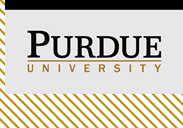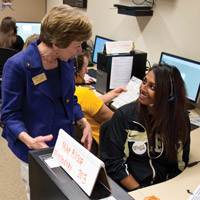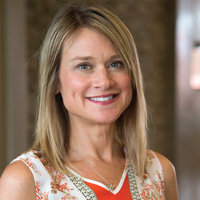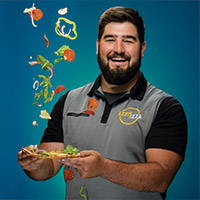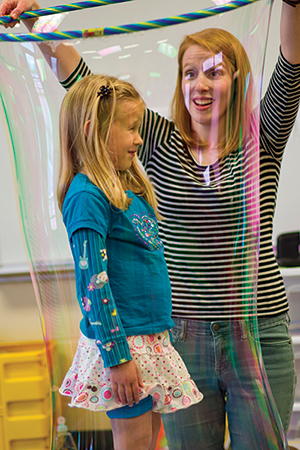
During the spring semester of her senior year, Anne Miltenberger didn't take a single class & yet she had never worked harder in school. Miltenberger graduated in May 2014 with a degree in early childhood education and exceptional needs, and spent her last semester student teaching preschool and prekindergarten special education at Frontier Elementary in Brookston, Indiana.
By the end of the semester, she was managing the classroom, creating and implementing lesson plans, and communicating with parents about their children's progress. These real-world responsibilities could easily have been overwhelming for a college student, but Miltenberger had an arsenal of experience to rely on. As a sophomore, she completed her first practicum at the Ben and Maxine Miller Child Development Laboratory School in the Department of Human Development and Family Studies. From that point on, she was in a classroom every semester, working with preschoolers and kindergarteners, elementary school children and kids with special needs.
"Without the variety of hands-on experiences, I would not have been able to get the full scope of what my degree entails," Miltenberger says. "The bookwork laid the foundation for my practice, but the real learning took place in the classrooms where I taught. Experiencing education creates the most fruitful learning."
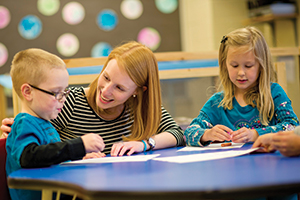
Student teacher Anne Miltenberger leads a classroom activity (top, left) and spends some one-on-one time with a student (above) at Frontier Elementary in Brookston, Indiana. During the spring 2014 semester, she student-taught two classes four days a week with about 15 children, ages 3 to 6 years, in each class. (Photos by Steven Yang)
Miltenberger's experience is not unusual in the College of Health and Human Sciences. The majority of HHS students will graduate having had some sort of hands-on learning such as internships, undergraduate research, clinical experiences, student teaching or service learning. Thirty percent of majors in the college require an experiential learning component as a degree requirement.
In the recent Gallup-Purdue Index, a survey of more than 30,000 U.S. college graduates, findings showed that those who were closely engaged with faculty or had participated in experiential learning as a student were twice as likely to be engaged in their current work as those who did not have those experiences. The index seeks to measure the most important outcomes of higher education, including engagement in the workplace and high levels of well-being. The full report is available at www.gallup.com.
Diving into research
Undergraduate research is one of the ways students can gain hands-on experience while also working closely with faculty and graduate students. All academic units in the college offer this opportunity, some as early as a student's second semester. Psychological Sciences and Nutrition Science both offer research-focused honors programs for top students.
Alex Jones is a senior in the health sciences pre-professional program, but he had no research experience when, as a freshman, he started working in the lab of Wei Zheng, professor and head of the School of Health Sciences. The lab's research investigates how manganese affects the body and how it can produce many of the same symptoms and neurological problems as Parkinson's disease.
Jones' aspect of the project involves looking at how manganese is stored and released in bone tissue. He's done work to determine the rate at which the element accumulates in the bone and the rate at which it's released back into the body & important because it provides insight into how long manganese can remain in the body before having a toxic effect on the brain.
"Alex is a great example of a student knowing nothing about research, but who, through hands-on learning, will become an expert in a particular field," Zheng says. "In fact, his work has earned him a co-authorship on one of our recently accepted papers."
Jones plans to attend medical school and says the medical field is the best possible way to combine his fascination with science, enthusiasm for people, and his problem-solving nature. He believes his exposure to research is critical to his future success. Already, he is benefiting from the ability to research scholarly articles, understand the material presented, and then use that information in his own projects.
"It has vastly expanded my understanding of how the scientific community operates and advances our knowledge of the world around us," he says. "The greatest surprises are the realizations that nothing ever proceeds as it was originally envisioned, and the amount of time and effort put into research is not always proportional to the quality of results. I've come to realize that these frustrations are nearly unavoidable and simply part of the scientific research process."


